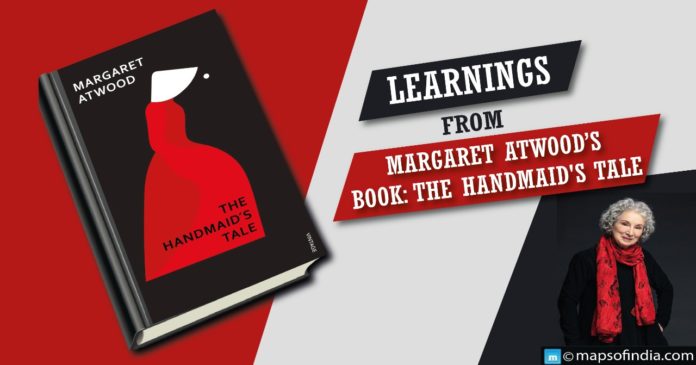” Better never means better for everyone, he says. It always means worse for some”
The Handmaid’s Tale is a dystopian novel by two time Booker Prize winner Margaret Atwood. It is set in a future where women have been stripped of all rights, and America is lead by a Christian religious regime. The book has been picked up for a show and is available on Amazon Prime in India. It is a highly critically acclaimed novel with beautifully detailed prose that reflects Atwood’s strong writing style and thinking.
Based on a speculative theocratic future, we are introduced to Offred, the protagonist of the story. America is ruled by a dictatorship known as the ‘Republic of Gilead’ where women rights are limited; they are denied education and are forbidden from reading. Women are divided into four groups known as the Commander’s wife, aunts, Marthas and handmaids. All women have a purpose; the main character, Offred, is a Handmaid.
Handmaids are women whose sole purpose is to reproduce and provide children for the Republic of Gilead. The Marthas are the servants of the households, and their only purpose is to cook and keep houses clean. The Aunts are anti-feminist women who teach younger women about Gilead’s sacred responsibility and their honourable roles. They believe women deserve no rights and are safer this way.
Handmaids have more restrictions than anyone else. They aren’t allowed to talk to each other or have names. Offred here means OF Fred that she belongs to Fred. Offred remembers a time when women had rights when she used to work and have a family and control over her own body.
What makes the story even more nightmarish is that everything we read in the book, every act of violence against women, has already occurred in history. Margaret Atwood cleverly used moments of history in which women had to suffer at the hands of men and male ego. Even the idea of a handmaid is taken from biblical references.
Throughout history, men have reigned as women have watched from the mere sidelines. All their potential is wasted, and all their cries go unheard. Margaret Atwood’s speculative fiction isn’t a look into the future but a warning of what comes next when you let religion and politics mix together. What happens when women are stripped of all their rights and men are given all the power in the world.
The Handmaid’s tale ends with the line, “Any more questions?” The book leaves you bewildered, horrified and in deep thoughts about feminism, taking a stand and fighting for your rights in a male-dominated world.





